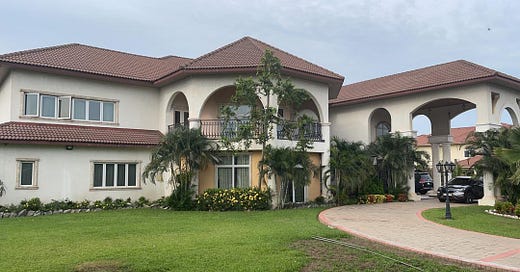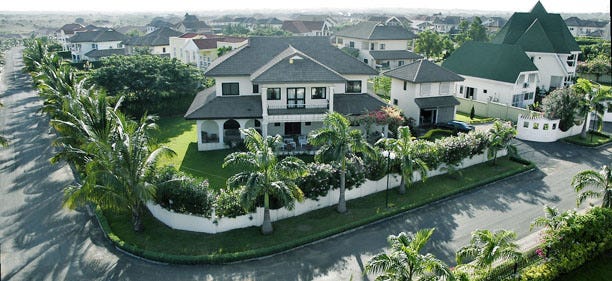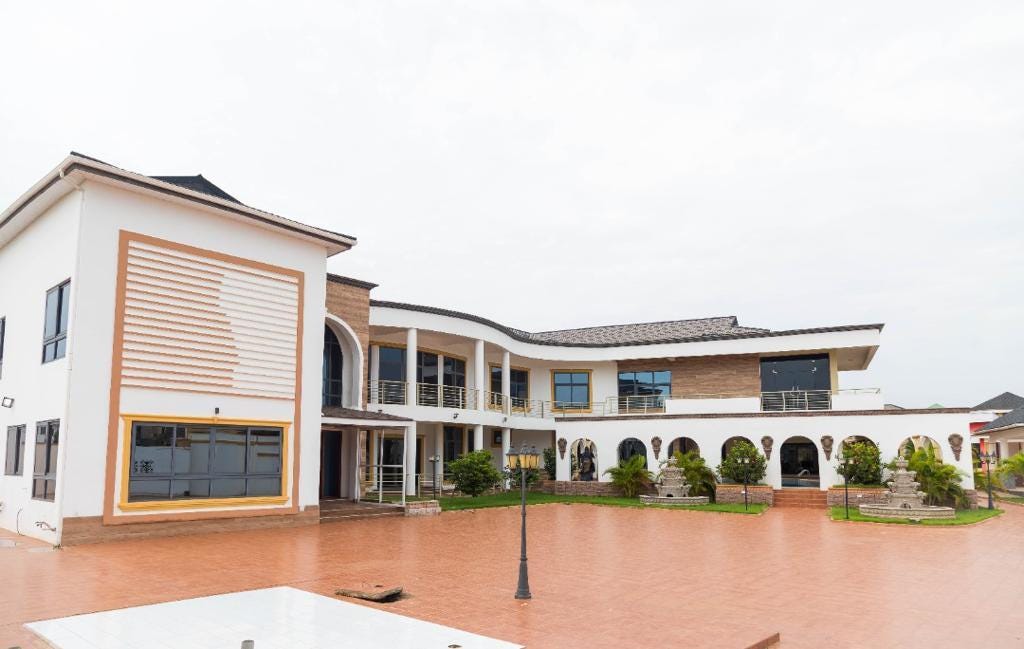For as long as I can remember, my parents have been sending money back to Ghana. If you grew up as a second-gen African, in fact from any other developing country, you're probably familiar with Western Union, MoneyGram, or your local money transfer service. In our case, we used George Mobile, run by a man who was everyone's "uncle" in the community. He offered the best black-market exchange rates to all the aunties and uncles.
Money was sent back home for all kinds of reasons, family support, medical bills—but the biggest one was to build a home. My parents worked two, sometimes three jobs at a time, not only to provide for us but to send a significant portion of their income back home each month to build their retirement mansion. Most of my aunts and uncles were doing the same.
I vividly remember my parents on the phone with relatives they had entrusted as project managers, arguing about why things weren’t done on the build, how many blocks were laid that day, or people trying to claim land that they had already paid for. It’s admirable when you think about it, I’m not sure if I could endure the same today.
When we had family gatherings, the conversation often turned to updates on these building projects. Aunties and uncles would compare progress notes and photo’s sent from Ghana.
That generation sacrificed so much. They worked extra hard to build their dream homes, often foregoing holidays, nicer homes in their adopted countries, or even just small enjoyment so they could achieve that goal.
I remember my Auntie Comfort, who had two cleaning jobs and lived in a small two-bedroom flat with her three kids, yet she was building a mansion in Kumasi. She used to talk about shipping a jacuzzi for her retirement. Uncle Boat, who worked as a security guard all his life and lived in a one-bedroom flat with his family, bought three acres of land in Accra to build a home with a swimming pool. My parents, too, have two homes in Ghana, a four-bedroom in Accra and an eight-bedroom in Kumasi, both of which they spent years of hard work to build.
Now that my parents are well into their retirement, it's time for them to enjoy the homes they spent decades building. But they’re still here. This seems to be a common theme among my many who built homes in the 90s and early 2000s, they’re not living in them.
I spent five years living in Ghana and worked in relocation during my first few years. I saw firsthand the many beautiful, yet empty, mansions, some collecting dust. It was disheartening to see estates filled with huge, unoccupied homes. When I’d ask about the owners, the response was always the same: "They live in the UK," or "They live in the US."
And let me tell you, some of these mansions are among the most beautiful homes I’ve ever seen. I’ve come across ones with Olympic-sized pools, sprawling acres of lush tropical gardens, and floor-to-ceiling Italian marble. In some, peacocks roam freely through the grounds.
The reality is, many from that generation, those who immigrated in the late 80s and 90s, are caught between two worlds. Take my mom, for example. She finds it hard to stay in Ghana for more than six months at a time. She loves Ghana, the food, the familiarity, the sense of freedom, but I know she misses the UK when she’s there. Though she'd never admit it, it's clear. She has spent most of her life in the UK. She came to Europe at 22 and now, at 67, has built a life here. Her friends are here. Her independence is here. She knows how everything works, has her free bus pass, can drive to the shopping center, or walk to church where she’s been part of a community for over 20 years. When she’s in Ghana, it’s almost like a culture shock for her.
Interestingly, my mom is also learning to enjoy life in the UK now, something she never did before. She meets up with her old friends from work once a week for coffee or a pub lunch. It’s heartwarming to see her starting to relax and enjoy herself, something she rarely allowed herself to do.
My dad’s experience has been a bit different. He’s been in Ghana for the past three years and has established a business. Despite his daily complaints about the challenges of living there, I think he finds peace in Ghana. But, like my mom, his heart is still partly in the UK, where his family and community remain. I have found that it is is a little different for the men thought they seem to go back more than our mothers, anyway thats a whole other subject.
Sometimes I feel sad for my parents and others who immigrated for a better life. They must feel torn, unsure of where they truly belong. Is it Ghana where they spent their formative years, or where they've built a life and community? My parents reminisce about Ghana in the 80s with such fondness, but the place they return to now, though physically the same, feels different to them.
I wonder what the future holds as they grow older. Will they eventually make the full move back to Ghana, or will they stay in the UK to be close to their children and grandchildren?
As second-generation immigrants, we face our own set of challenges. How will we care for our parents as they age? I worry about mine when they’re in Ghana. As they get older, health risks increase, and the healthcare system there isn’t the same as the NHS. Being so far away can be unsettling.
And then there are the empty mansions. What will happen to them when our parents are no longer here? How will our generation manage that legacy?
Wishing you a great week
Ohenewah









Wow! This is such an interesting story. Very new idea to me. I can only imagine how torn they feel. Perhaps building the home was the incentive to return back permanently. Not realizing other factors would make them reconsider. Thanks for sharing.
Haitian here. Remember all the money my mom use to send back home for a home she never got to see. It’s beautiful to see what the vision was suppose to be. I realize it takes money and stability to make things like these happen. I don’t know if I’ll ever be able to visit Haiti, her homeland. Especially with the way things are now.